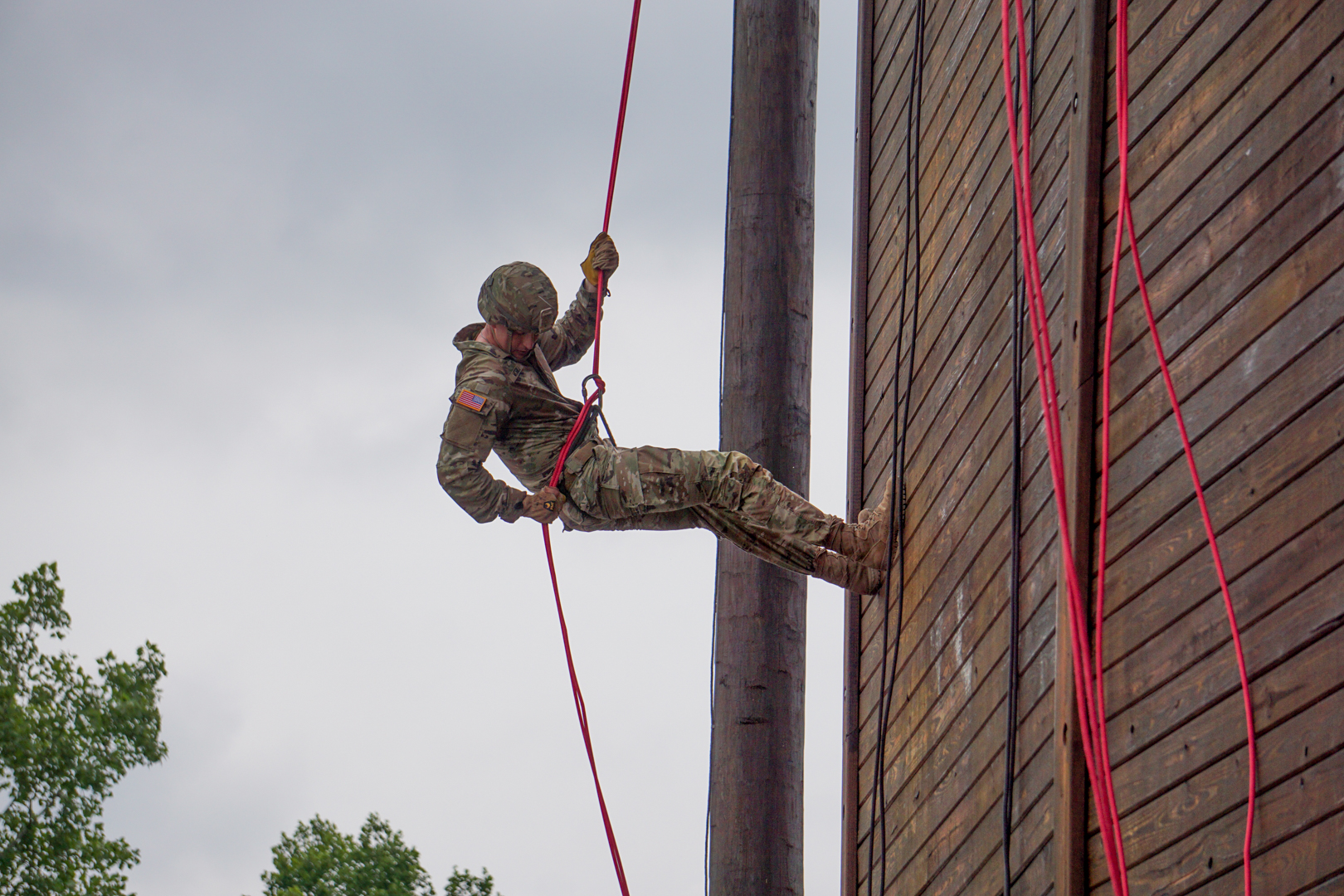
Cadet Nathen Silsby sleds down the snow slope of the hill while Spanish soldiers and American cadets watch.
This summer I had the chance to visit Spain, along with 19 other U.S. Army Cadets, and interact with Spanish mountain troops on a military-to-military contact mission. The opportunity to travel to Spain and represent the U.S. Army on a cultural immersion trip offered the experience of a different culture which opened us up to a worldly perspective rather than one of close-mindedness.
The Spanish Mountain troops are located in the small but picturesque town of Jaca, in northeast Spain, in a valley of the Pyrenees Mountains. Our group of 20 Cadets spent two weeks with the Spanish Mountain troops exposed to the different aspects of Spanish mountain warfare and operations. The training included learning the Spanish techniques for rappelling, belaying, and climbing used during mountain movement. I had very little experience in the rappelling and belaying techniques but from what I saw, the Spanish methods were very similar to what I had been taught in my ROTC unit. During the two weeks, we were able to participate in two field training exercises, an overnight exercise and a three night exercise.
The first training exercise was memorable and I enjoyed the experience, especially the time spent once the Spanish troops and our group reached the camp site.
The plan was to hike with military backpacks weighing roughly 30 pounds for 10 kilometers (6.2 mi) up to a peak of the Pyrenees called “Anayet.” The hiking itself was somewhat tiring because of the steepness, but the path up the mountain had an overall gradual incline and everyone was motivated to reach the top.
In higher sections of the Pyrenees snow still covered parts of the grass and rock, and in our camping area patches of snow surrounded the basin in which we had set up. Almost immediately several Spanish soldiers decided to sled down the side of hill still covered in snow with a trash bag. At first we thought the Spanish were insane to be running through the snow in the mountains, barefoot and sledding down on a slope on a trash bag.
Admittedly the whole idea was crazy—it was June 1st, there was still snow on the ground and the Spaniards were sledding. I had little intention of running barefoot through frozen snow but I was persuaded by the Spanish soldiers to join in the fun.
I thought, Why not? Embrace the culture and interact with the Spanish. So, I decided to take off my combat boots and socks, roll up my ACU trousers and play in the snow.
Three of us approached the grassy bottom of the slope and on the count of three ran barefoot through the icy, cold, snow racing for the top before our feet froze. Thankfully, the Spaniards had a towel to dry the snow off. It was at least a minute before I could feel my feet!
Many of the Spanish soldiers took the lead and showed us the best method to sled down the slope. After a demonstration, Cadet Anthony Weckerling attempted to slide down the hill using the trash bag. As Weckerling prepared to slide down the hill Cadet James Mitchell gave him a push and Weckerling slid down most of the hill stopping just short of large rock that protruded out of the snow.
Several more brave Cadets took turns sledding down the snowy slope. Once the majority of Cadets had taken turns sledding down the hill, I decided that I wanted to have a go. I grabbed the trash bag, got a running start and headed down the hill on my stomach. I made some distance and after that one run, I had enough. At least I could say that I had been sledding with the Spanish soldiers, in summer, in the Pyrenees Mountains.
That training exercise in the Pyrenees Mountains with the Spanish soldiers is one that I will never forget and defines part of the cultural experience of the CULP program. We, American Cadets, were immersed with the Spanish and had the opportunity to participate in an activity with them. The common activity of sledding down a hill brings back memories of childhood shared between both cultures. Despite the language barrier, the activity of sledding was recognized by both cultures and we embraced the Spanish soldiers’ tradition despite the insanity of sledding barefoot on a hill in the mountains on the first of June.

Cadet James Mitchell stands on top the snow slope to give Cadet Anthony Weckerling a push down the hill.
This small experience from the larger experience of cultural immersion in Spain showed us how different cultures, despite barriers, can find a common ground and interact professionally, personally, and socially.
The CULP experience in Spain was outstanding and should continue in the future to build stronger bonds with the Spanish military.




